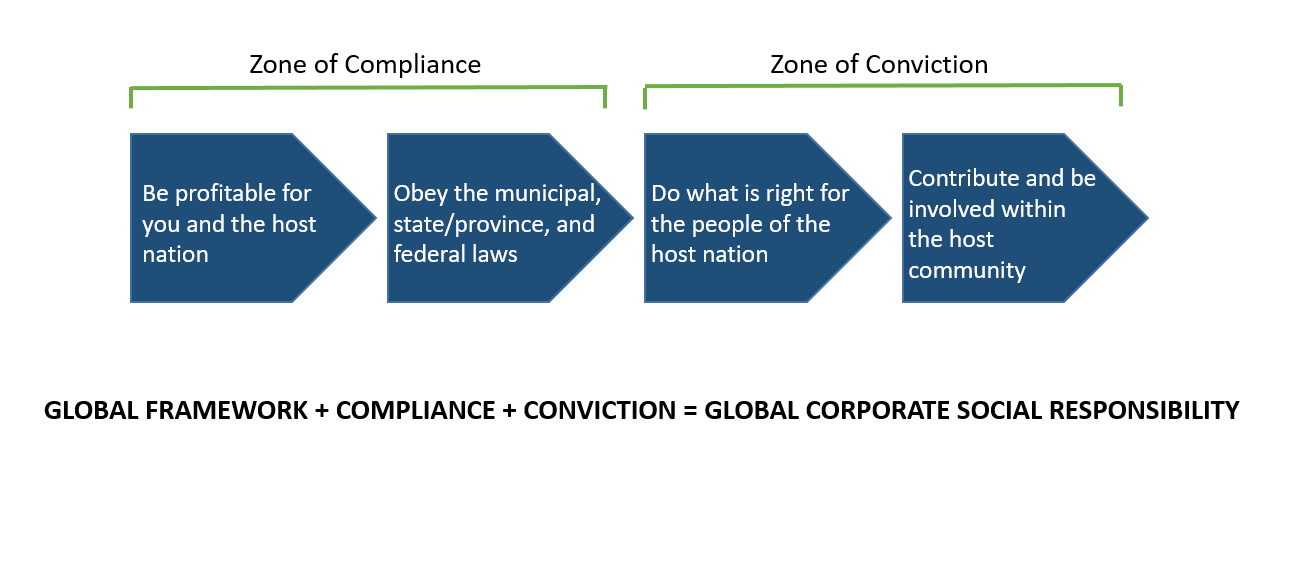5.4 Modern Corporate Social Responsibility

In Canada in 2003, the province of Ontario passed bill 198, which made sweeping and significant changes to how provincial companies report financial standing to provide the public with more corporate transparency[18]. This is one of the modern initiatives of engaging in CSR, and since 2003, it has grown. More in the area of environmental responsibility, companies today strive for a sustainable model within their organization. Areas where this is prevalent is in how organizations balance present and future needs, environmental protection, and economic development. There are five key reasons in why companies embrace a sustainable model:
- Cost Reduction
- Resource Preservation
- Legislative Compliance
- Reputation
- Right Initiative
More will be discussed in Chapter five section five about the different levels of a sustainable model. The fact remains that organizations in the modern landscape tend to lean toward a sustainable model. There is a key trend that relates to the upholding of a sustainable model: the young, up-and-coming consumers feel social and environmental responsibility are important. A recent survey, conducted by Horizon Media, found that “81% of millennials expect companies to make a public commitment to good corporate citizenship”[19]. In addition, the 2015 Cone Communication survey found that 9 out of 10 millennials would switch brands to one associated with a cause[19]. Even with the recent defunding of many environmental programs (United States being a prime example) companies still follow a sustainable model within their organizations, ensuring that their triple bottom line is met.
Changes in philanthropic measures have also been a factor caused by a rise in CSR. It seems that philanthropy would, in itself, be a socially responsible measure. However, strategic giving ties the philanthropy and CSR to the company’s mission, vision, values and targeted donations to local areas[20]. Strategic giving brings a global idea of philanthropy and brings it to a community level, meeting a host of social and economic needs with a “think globally, act locally” mentality.
There are challenges when looking at CSR within the context of the global environment. Many multinational corporations must balance challenges, such as respecting local practices and traditions, maintaining positive relationships with the host population, and conflicting interests of stakeholders in the area of human rights[20]. Whether it be a local company, or a large multinational conglomerate, it is best that the organizations exemplify a level of good conviction and good compliance in order to maintain good ethical status and relationships within a foreign country.

Although CSR is not a complete fix to organizational challenges, or the only factor, in making an organization successful, it is a good first step. Within learning organizations, CSR changes have found its place in the administrative conversation. At the University of Windsor, the Environmental Sustainability Advocacy (ESA) have the goals of making the university a more “ecologically responsible place to work, study, teach, and conduct research”[21]. In a new global marketplace, the CSR trend does not seem to be going away, given the impact it has on many young consumers within the marketplace. In relation to learning organizations, younger professors and administrators are entering the workforce and expanding on the concept of CSR, which will remain strong.
CSR within the workplace also extends beyond the workplace, De Jonge explains the role organizations have with regard to understanding domestic violence and its effect on the organizational structure of a company, and how leaders should deal with this turbulent issue [22]. It must be said that CSR must be able to deal with large problems at a social and personal level to be effective.
Ties philanthropy to the organizations corporate social responsibility (csr) of mission, vision, and values

